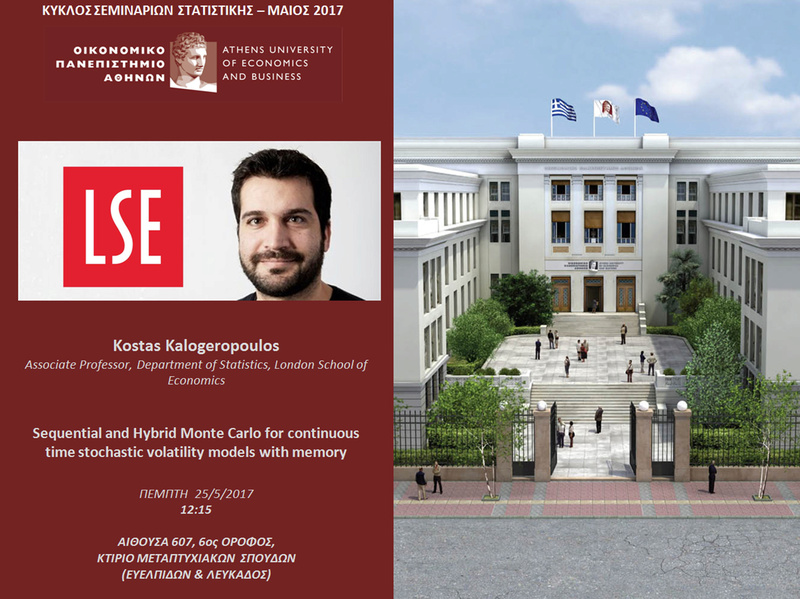 AUEB STATS SEMINARS: Sequential and Hybrid Monte Carlo for continuous time stochastic volatility models with memory by Kostas Kalogeropoulos
AUEB STATS SEMINARS: Sequential and Hybrid Monte Carlo for continuous time stochastic volatility models with memory by Kostas Kalogeropoulos
Wed 17 May 2017 - 23:55
AUEB STATISTICS SEMINAR SERIES MAY 2017

Kostas Kalogeropoulos
Associate Professor, Department of Statistics, London School of Economics
Sequential and Hybrid Monte Carlo for continuous time stochastic volatility models with memory
THURSDAY 25/5/2017
12:15
ROOM 607, 6th FLOOR,
POSTGRADUATE STUDIES BUILDING
(EVELPIDON & LEFKADOS)
ABSTRACT
We consider continuous-time stochastic volatility models driven by fractional Brownian motion. Due to the non-Markovianity and high-dimensionality of the latent paths, estimating posterior expectations is a computationally challenging undertaking. We present a re-parameterisation framework based on the Davies and Harte method for sampling stationary Gaussian processes and use this framework to construct a hybrid Monte Carlo algorithm that allows computationally efficient Bayesian inference despite the high-dimensional latent variables arising in this context. The hybrid Monte Carlo algorithm can either be used on its own or undertake the task of the rejuvenation step in a sequential Monte Carlo algorithm. The latter not only allows a more robust computational scheme, but also offers a model choice framework that can be based on either i) the marginal likelihood estimates or ii) model predictive performance through the sequences of posterior predictive distributions. The methodology is illustrated on both simulated data and the S&P500 time series.
Facebook event: https://www.facebook.com/events/1885396095071221/

Kostas Kalogeropoulos
Associate Professor, Department of Statistics, London School of Economics
Sequential and Hybrid Monte Carlo for continuous time stochastic volatility models with memory
THURSDAY 25/5/2017
12:15
ROOM 607, 6th FLOOR,
POSTGRADUATE STUDIES BUILDING
(EVELPIDON & LEFKADOS)
ABSTRACT
We consider continuous-time stochastic volatility models driven by fractional Brownian motion. Due to the non-Markovianity and high-dimensionality of the latent paths, estimating posterior expectations is a computationally challenging undertaking. We present a re-parameterisation framework based on the Davies and Harte method for sampling stationary Gaussian processes and use this framework to construct a hybrid Monte Carlo algorithm that allows computationally efficient Bayesian inference despite the high-dimensional latent variables arising in this context. The hybrid Monte Carlo algorithm can either be used on its own or undertake the task of the rejuvenation step in a sequential Monte Carlo algorithm. The latter not only allows a more robust computational scheme, but also offers a model choice framework that can be based on either i) the marginal likelihood estimates or ii) model predictive performance through the sequences of posterior predictive distributions. The methodology is illustrated on both simulated data and the S&P500 time series.
Facebook event: https://www.facebook.com/events/1885396095071221/
- AUEB Stats Seminars 5/2/2021: Manifold Markov chain Monte Carlo methods for Bayesian inference in a wide class of diffusion models
- AUEB Stats Seminars 27/5/2021: Manifold Markov chain Monte Carlo methods for Bayesian inference in a wide class of diffusion models by Alexandros Beskos
- AUEB Stats Seminars 28/3/2023: Can independent Metropolis samplers beat Monte Carlo? by Petros Dellaportas (Department of Statistics, AUEB & UCL)
- AUEB Stats Seminars 10/6/2021: Monte-Carlo Statistical Methods for Parameter Estimation of the GreenLab Plant Growth Model by S. Trevezas
- AUEB-Stats Seminars 12/4/2024: Bayesian inference with variable-memory models for times series by Ioannis Kontoyiannis (Professor | Department of Pure Mathematics and Mathematical Statistics, University of Cambridge, UK)
Permissions in this forum:
You cannot reply to topics in this forum

 Grstats
Grstats
